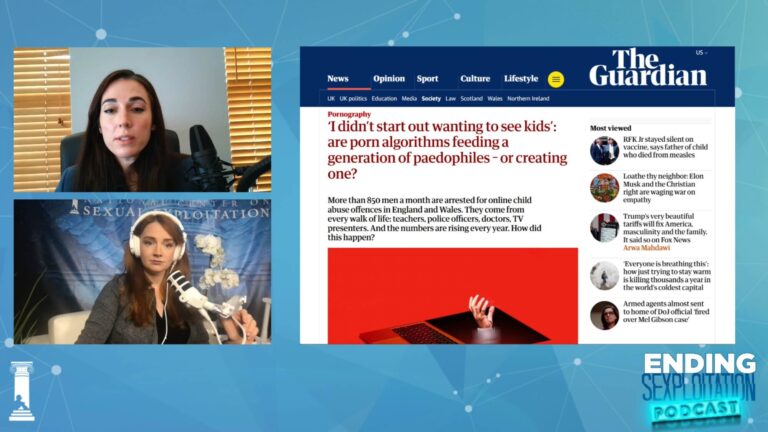This research summary was co-authored by Lisa Thompson (Vice President and Director of the NCOSE Research Institute) and Jordan Marshall (Research Assistant).
J. Castro-Calvo et al., “Cognitive Processes Related to Problematic Pornography Use (PPU): A Systematic Review of Experimental Studies,” Addictive Behaviors Reports 13 (2021): 100345, doi:10.1016/j.abrep.2021.100345.
Key Takeaway
A review of 21 experimental studies from six countries found that problematic pornography use (PPU) was related to negative impacts on brain function in four cognitive areas: attentional bias (in this case toward sexual cues), less inhibitory control, poorer working memory, and impaired decision making. Negative impacts in these cognitive areas are highly associated with substance and behavioral addictions.
Study Highlights
This review explored existing evidence regarding problematic pornography use (PPU) and its impact on people’s thought processes. PPU is characterized by:
- excessive time and effort spent on watching and searching for pornography
- impaired self-control over pornography use
- failure to fulfill family, social, or work responsibilities
- persistence in these sexual behaviors regardless of consequences
Twenty-one experimental studies from six countries were included in this review. Collectively the studies assessed 1,706 participants. The studies were analyzed for the cognitive domain evaluated and the experimental tasks used in their assessments (e.g., type of task, stimuli employed, instructions).
The study reported:
- Findings from all five studies which tested for “attentional bias” showed that individuals with PPU or greater pornography consumption are more likely to show attentional bias toward sexual stimuli. This is significant because attentional bias is a known indicator of addiction. According to classical conditioning processes, cues related to addiction (e.g., a wine bottle to an alcoholic) are more attention grabbing to people with addictions than those without. The results from this review show that in the case of people with PPU, they are more likely to prefer and have their attention captured by sexual imagery.
- PPU is related to impaired “inhibitory control.” Inhibitory control is an executive function which plays a “central role” in regulating human behavior. It is especially critical in managing what we call “self-control”—that is resisting temptations and resisting acting impulsively.[1] It allows people to suppress or override certain thoughts, actions, and emotions so that they choose behaviors that allow them to meet goals and avoid negative consequences. This review showed that individuals with PPU have more problems with motor response inhibition and shifting attention away from irrelevant stimuli.
- Individuals with PPU and/or greater pornography use are more likely to perform worse in tasks assessing “working memory.” As the authors explained, “Working memory is necessary to keep things in mind while performing complex tasks, such as reasoning, comprehension, or learning.” Impairments to working memory increase the risk of engaging in problematic behaviors such as substance abuse and behavioral addictions. Results were “highly consistent,” showing that individuals with PPU or greater pornography use were found to perform worse in working memory tests compared to health controls, especially so when sexual stimuli was present at the same time.
- PPU is related to impaired decision making. Decision making, as defined by the authors, is the “ability to select optimal choices considering all available information.” People with impaired decision making tend to:
- prefer short-term small gains over long-term large gains (“delay discounting”)
- choose riskier options
- be more attracted to reward-related cues (e.g., drugs) despite negative consequences
- misjudge the likelihood and magnitude of potential outcomes
- persist in their decisions despite negative results
Commentary from the NCOSE Research Institute
Multiple studies associate these problems with addiction. This review showed that people with PPU prefer short-term small gains rather than long-term large gains, have more impulsive choice patterns, have approach tendencies toward sexual stimuli (results in this area were mixed), as well as inaccuracies when judging the likelihood and magnitude of potential outcomes under ambiguity.
Thus, in all four cognitive areas assessed, PPU use was associated with negative impacts to brain function. The authors also noted that therapies that aim to improve different executive functions have been effective in reducing symptoms of various substance abuse disorders and may also assist in reducing the impact of PPU. They concluded by noting that their review provides a comprehensive overview of evidence regarding PPU cognitive impairments but cautioned against taking these findings as evidence of an “undeniable relationship” between PPU and negative impacts on these thought processes. With that caution in mind, we note that the evidence from this review is strongly pointing in one direction—that PPU is related to executive function impairments—and look forward to additional research that will shed further light on this subject.
References
[1] Adele Diamond, “Executive Functions,” Annual Review of Psychology 64 (2012): 135–168, doi: 10.1146/annurev-psych-113011-143750.


